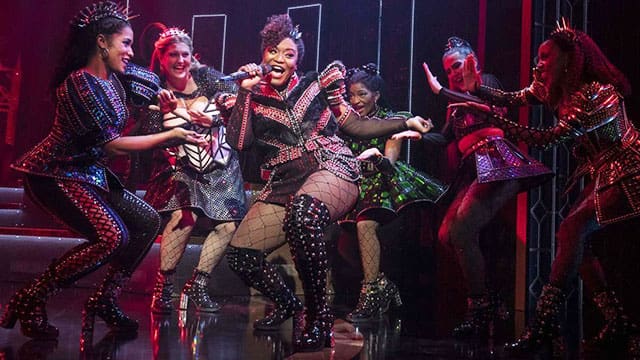The men in the audience appeared as bored as I was by the feminist themes of Six: The Musical
 My wife recently mentioned to me that Six: The Musical was heading into its final few weeks at Toronto’s Royal Alexandra Theatre. She wanted to see the award-winning musical about the six wives of King Henry VIII before it left town.
My wife recently mentioned to me that Six: The Musical was heading into its final few weeks at Toronto’s Royal Alexandra Theatre. She wanted to see the award-winning musical about the six wives of King Henry VIII before it left town.
While I’m quite familiar with this fascinating period of British history, I didn’t know much about Six. I’ve never particularly cared for musicals, to be honest. Yet, I’ve enjoyed live performances of several of them, including Jesus Christ Superstar, The Phantom of the Opera, Cats, Come From Away and, most recently, Hamilton.
So, I was happy to see if we could add this one to the list. We were able to procure tickets in late April and went to the May 11 performance.
My wife enjoyed Six. She liked the upbeat music and feel-good vibe, and happily clapped and danced with others during the final song. That’s great, and I’m pleased she did.
 |
| Related Stories |
| The remarkable journey of Ontario’s Stratford Festival
|
| Will Hamilton lead to a renewed interest in American history?
|
| Director examines colonization in production of classical play
|
What about me? Well, not so much.
Let me explain why.
I’m not suggesting Six was a lousy musical. There were some good musical numbers, including “Don’t Lose Ur Head” by Julia Pulo, who played the second wife, Anne Boleyn. The banter between Pulo, Hailey Lewis (Catherine of Aragon), Abigail Sparrow (Jane Seymour), Krystal Hernandez (Anna of Cleves), Elysia Cruz (Katherine Howard) and Lauren Mariasoosay (Catherine Parr) was amusing in places. And there’s no question that most audiences would appreciate the upbeat, high-energy tempo.
That’s why this 80-minute musical has had a successful run in venues such as London’s West End, Broadway in New York City and Toronto. That’s why the Broadway production earned two Tony Awards, including Best Original Score for co-creators Toby Marlow and Lucy Moss, and four Drama Desk Awards. That’s why this musical has earned positive reviews, including Frank Rizzo’s Oct. 3, 2021 assessment for Variety, “It may not be Masterpiece Theater, but this ‘Six’ is a solid ‘10’ for joy.”
Alas, I don’t believe Six plus Henry VIII makes anywhere near a Perfect 10.
Besides my general disinterest in musical theatre, there were other things I didn’t care for. The historical component barely existed and wasn’t in the same category as something like Hamilton. The interplay between the six wives contained modern language, juvenile humour and sexual innuendo that you would expect from teenagers or Millennials. Henry VIII never appeared despite being a focal point of numerous discussions. The music also wasn’t to my taste, which is what it is.
The biggest sticking point is that Six is clearly a female-oriented musical. To me, anyway.
The entire cast was made up of women, including the musicians. The music, subject matter and humour were largely geared toward women. The various themes, including female empowerment, beauty and victimhood, working together to build a community, talking about “her-story” (instead of history) and the competition to find the winning Queen, would have mostly appealed to women.
All of this explains another crucial fact. More than three-quarters of the seats in the Royal Alexandra Theatre were filled by women and young girls. That’s a rough estimate on my part, but I’ll bet it’s pretty close to the actual number.
I was struck by the number of female audience members seated around us. The loudest and noisiest voices were women, as were the most enthusiastic and bombastic when it came to singing, dancing and laughing at jokes. The small number of men in our area that I could see either looked bored or fairly disinterested from start to finish.
There’s obviously nothing wrong with creating a theatrical performance geared toward a particular race, religion, sexual orientation or gender. Some male audience members I didn’t see that evening may have enjoyed the performance as much as most women did.
At the same time, it’s not the wisest of strategies to narrowcast your audience. When you consider how different the two genders are – men are from Mars, and women are from Venus, as relationship counsellor John Gray’s book famously states – the better plan of action would have been to thread an imaginary line between them. Six would still have succeeded and could have ended with a broader appeal.
My wife asked me at one point, “Are you hating this?” My response? “Well … what do you want me to say?” She laughed, knowing full well what I was thinking at that moment. I added this before she responded, “All kidding aside, no, I don’t hate it. Are you enjoying it?” She smiled and said yes, and I told her that’s all that really matters.
As for my analysis of Six, as one of the lines from “Don’t Lose Ur Head” goes, I’m sorry, not sorry.
Michael Taube, a Troy Media syndicated columnist and political commentator, was a speechwriter for former Prime Minister Stephen Harper. He holds a master’s degree in comparative politics from the London School of Economics.
For interview requests, click here.
The opinions expressed by our columnists and contributors are theirs alone and do not inherently or expressly reflect the views of our publication.
© Troy Media
Troy Media is an editorial content provider to media outlets and its own hosted community news outlets across Canada.


